Related Research Articles

Military ranks are a system of hierarchical relationships, within armed forces, police, intelligence agencies or other institutions organized along military lines. The military rank system defines dominance, authority, and responsibility in a military hierarchy. It incorporates the principles of exercising power and authority into the military chain of command—the succession of commanders superior to subordinates through which command is exercised. The military chain of command constructs an important component for organized collective action.

Military recruit training, commonly known as basic training or boot camp, refers to the initial instruction of new military personnel. It is a physically and psychologically intensive process, which resocializes its subjects for the unique demands of military employment.
Corporal is a military rank in use by the armed forces of many countries. It is also a police rank in some police services. The rank is usually the lowest ranking non-commissioned officer. In some militaries, the rank of corporal nominally corresponds to commanding a section or squad of soldiers.
The Officers' Training Corps (OTC), more fully called the University Officers' Training Corps (UOTC), are military leadership training units operated by the British Army. Their focus is to develop the leadership abilities of their members whilst giving them an opportunity to take part in military life whilst at university. OTCs also organise non-military outdoor pursuits such as hill walking and mountaineering. UOTC units are not deployable units nor are their cadets classed as trained soldiers until completion of MOD 1 training. The majority of members of the UOTC do not go on to serve in the regular or reserve forces.

The Army Cadet Force (ACF), generally shortened to Army Cadets, is a national youth organisation sponsored by the United Kingdom's Ministry of Defence and the British Army. Along with the Sea Cadet Corps and the Air Training Corps, the ACF make up the Community Cadet Forces. It is a separate organisation from the Combined Cadet Force which provides similar training within principally private schools.

The Royal Bermuda Regiment (RBR) is the home defence unit of the British Overseas Territory of Bermuda. It is a single territorial infantry battalion that was formed on the amalgamation in 1965 of two originally voluntary units, the mostly black Bermuda Militia Artillery (BMA) and the almost entirely white Bermuda Rifles, and the only remaining component of the Bermuda Garrison since the 1957 withdrawal of regular units and detachments from Bermuda.
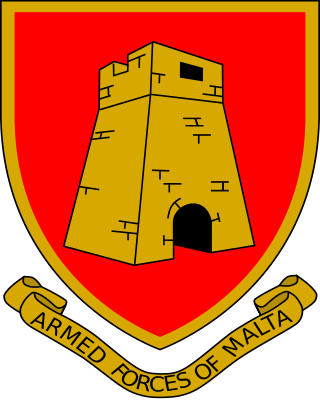
The Armed Forces of Malta is the name given to the combined armed services of Malta. The AFM is a brigade sized organisation consisting of a headquarters and three separate battalions, with minimal air and naval forces. Since Malta is the guardian of the European Union's southernmost border, the AFM has an active role in border control.

The National Cadet Corps (NCC) is the youth wing of the Indian Armed Forces with its headquarters in New Delhi, India. It is open to school and college students on voluntary basis as a Tri-Services Organisation, comprising the Army, the Navy and the Air Force. Cadets are given basic military training in small arms and drill. Officers and cadets have no liability for active military service once they complete their course.

A rifleman is an infantry soldier armed with a rifled long gun. Although the rifleman role had its origin with 16th century hand cannoneers and 17th century musketeers, the term originated in the 18th century with the introduction of the rifled musket. By the mid-19th century, entire regiments of riflemen were formed and became the mainstay of all standard infantry, and rifleman became a generic term for any common infantryman.

The Bermuda Volunteer Rifle Corps (BVRC) was created in 1894 as a reserve for the Regular Army infantry component of the Bermuda Garrison. Renamed the Bermuda Rifles in 1951, it was amalgamated into the Bermuda Regiment in 1965.

'Warwick Camp' was originally the rifle ranges and a training area used by units of the Bermuda Garrison based elsewhere in the colony. Today, the Camp is the home of the Royal Bermuda Regiment.
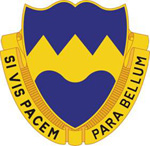
The 414th Regiment is a training regiment of the United States Army Reserve.
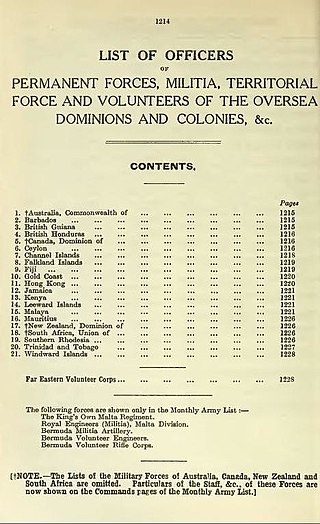
The British Colonial Auxiliary Forces were the various military forces of Britain's colonial empire which were not considered part of the British military proper.
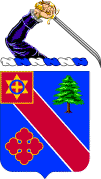
The 211th Military Police Battalion is a unit of the Massachusetts Army National Guard. Its Headquarters and Headquarters Detachment is descended from the First Corps of Cadets, initially formed in 1741. It is one of several National Guard units with colonial roots. Its motto is Monstrat Viam – "It Points the Way." While it has served in five wars, the sub-unit's primary contribution to Massachusetts and to the United States was as an officer-producing institution for new regiments from the Revolutionary War through World War II.

The Bermuda Garrison was the military establishment maintained on the British Overseas Territory and Imperial fortress of Bermuda by the regular British Army and its local militia and voluntary reserves from 1701 to 1957. The garrison evolved from an independent company, to a company of Royal Garrison Battalion during the American War of Independence, and a steadily growing and diversifying force of artillery and infantry with various supporting corps from the French Revolution onwards. During the American War of Independence, the garrison in Bermuda fell under the military Commander-in-Chief of America. Subsequently, it was part of the Nova Scotia Command until 1868, and was an independent Bermuda Command from then until its closure in 1957.

Prospect Camp, also referred to as Prospect Garrison, was the main infantry camp of the Bermuda Garrison, the military force stationed in the Imperial fortress of Bermuda. It also contained Fort Prospect, Fort Langton, and Fort Hamilton, as well as being the base for mobile artillery batteries, manned by the Royal Artillery. Outlying parts of the camp were disposed of in the early decades of the Twentieth Century as the garrison in Bermuda was reduced. The core area, including the barracks, passed to the local government when the garrison was withdrawn in 1957.
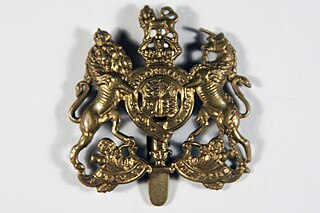
The Bermuda Militia Infantry was raised in 1939 as a part-time reserve of the British Army's Bermuda Garrison.

The page contains the current structure of the British Army. The British Army is currently being reorganised to the Future Soldier structure.

The Bermuda Cadet Corps was a youth organisation in the Imperial fortress colony of Bermuda, sponsored originally by the War Office and the British Army. Modelled on the Cadet Corps in England, now organised as the Army Cadet Force and the Combined Cadet Force, it was organised separately under Acts of the Parliament of Bermuda. It was one of three Cadet Corps that historically operated in the British territory, with the others being the Bermuda Sea Cadet Corps and the Air Training Corps, of which only the Bermuda Sea Cadet Corps remains. After more than a century of existence, the Bermuda Cadet Corps was disbanded in 2013 and replaced by the resurrected Junior Leaders programme of the Royal Bermuda Regiment.
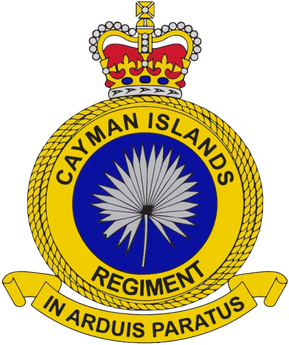
The Cayman Islands Regiment is the home defence unit of the British Overseas Territory of the Cayman Islands. It is a single territorial infantry and engineer reserve unit of the British Armed Forces that was formed in 2020. The regiment has an authorized strength level objective of 175 personnel, akin to that of a company-sized unit.
References
- 1 2 "Official History of the Junior Leaders' Regiment Royal Corps. of Signals" (PDF).[ dead link ]
- 1 2 "A Brief History of the Junior Leaders' Regiment RAC". Archived from the original on 9 May 2012. Retrieved 8 May 2012.
- ↑ "About the A.A.J.L.R."
- ↑ "IBB & Infantry Junior Leaders Battalion".
- ↑ "The Infantry Junior Leaders Battalion".
- ↑ "The Junior Parachute Company". Archived from the original on 13 December 2013. Retrieved 10 May 2012.
- ↑ "A Brief History of the Junior Leaders Battalion Royal Army Ordnance Corps 1945 – 1982 Royal Army Ordnance Corps".
- ↑ "The Junior Leaders Regiment RA". Archived from the original on 13 March 2013.
- ↑ "REA Junior Leaders". Archived from the original on 17 March 2012. Retrieved 8 May 2012.
- ↑ "Ministry of Defence: British Army Army Colleges" (PDF). Archived from the original (PDF) on 3 April 2012. Retrieved 8 May 2012.
- ↑ Zammit, Ray Cachia (26 March 2023). "The Victoria Lines, from conception to demise. What future?". Times of Malta. Malta. Retrieved 9 March 2024.
in 1866, William F. D. Jervois (later Sir), who had served as secretary of the commission, visited Malta and produced a report entitled Memorandum with reference to the improvements to the defences of Malta and Gibraltar, rendered necessary by the introduction of iron plated ships and powerful rifled guns. In this report, Malta, along with Gibraltar, Halifax and Bermuda, was given the designation of an "imperial fortress"
- ↑ The Army List 2015. United Kingdom: British Government. 2015. page x, PRECEDENCE OF REGIMENT AND CORPS, ETC.
28. The Bermuda Regiment
- ↑ "Junior Leaders parade". The Royal Gazette. City of Hamilton, Pembroke, Bermuda. 20 December 1969.
- ↑ News Staff (13 July 2023). "Regiment Junior Leaders enjoying summer camp". The Royal Gazette. City of Hamilton, Pembroke, Bermuda. Retrieved 31 May 2024.
More than 20 young people are learning, working and having fun together in the Royal Bermuda Regiment's summer camp for its Junior Leaders. The two-week programme operates as a culmination of training efforts for those who have been in the organisation for some time as well as a launch pad for others who recently joined. Teenagers spent their first seven days based at Warwick Camp, where activities included drill, fieldcraft and skill-at-arms lessons, as well as early-morning fitness sessions. A Junior Leaders in the Community exercise involved a trip to Dockyard for fun golf.
- ↑ "Junior Leaders". The Bermuda Regiment. The Bermuda Regiment. Retrieved 31 May 2024.
The Royal Bermuda Regiment Junior Leaders (JL) is a voluntary youth organization which exposes young people to military life and promotes leadership development, teamwork, discipline and fitness, and ultimately have fun.
- ↑ "The Bermuda Regiment Junior Leaders". The Bermuda Regiment. Archived from the original on 29 August 2012.
- ↑ The Royal Gazette: Cadet Corp to be replaced as budget savings are made. Published 21 March 2012 (Updated 21 March 2012)
- ↑ The Bermuda Regiment: Archived 2012-08-29 at the Wayback Machine The Bermuda Cadet Corps
- ↑ The Bermuda Regiment: Archived 2012-08-28 at the Wayback Machine Request for volunteer instructors for the Junior Leaders
- ↑ Junior Leaders, Regiment Team Up For Exercise. Bernews. 24 March, 2014
- ↑ Outward Bound, Bermuda. Our People: Archived 2016-11-19 at the Wayback Machine Lt Col BN Gonsalves, ED, tacsc
- ↑ "A BILL entitled ROYAL BERMUDA REGIMENT (JUNIOR LEADERS) ACT 2015. Parliament of Bermuda" (PDF). Archived from the original (PDF) on 18 October 2016. Retrieved 15 October 2016.